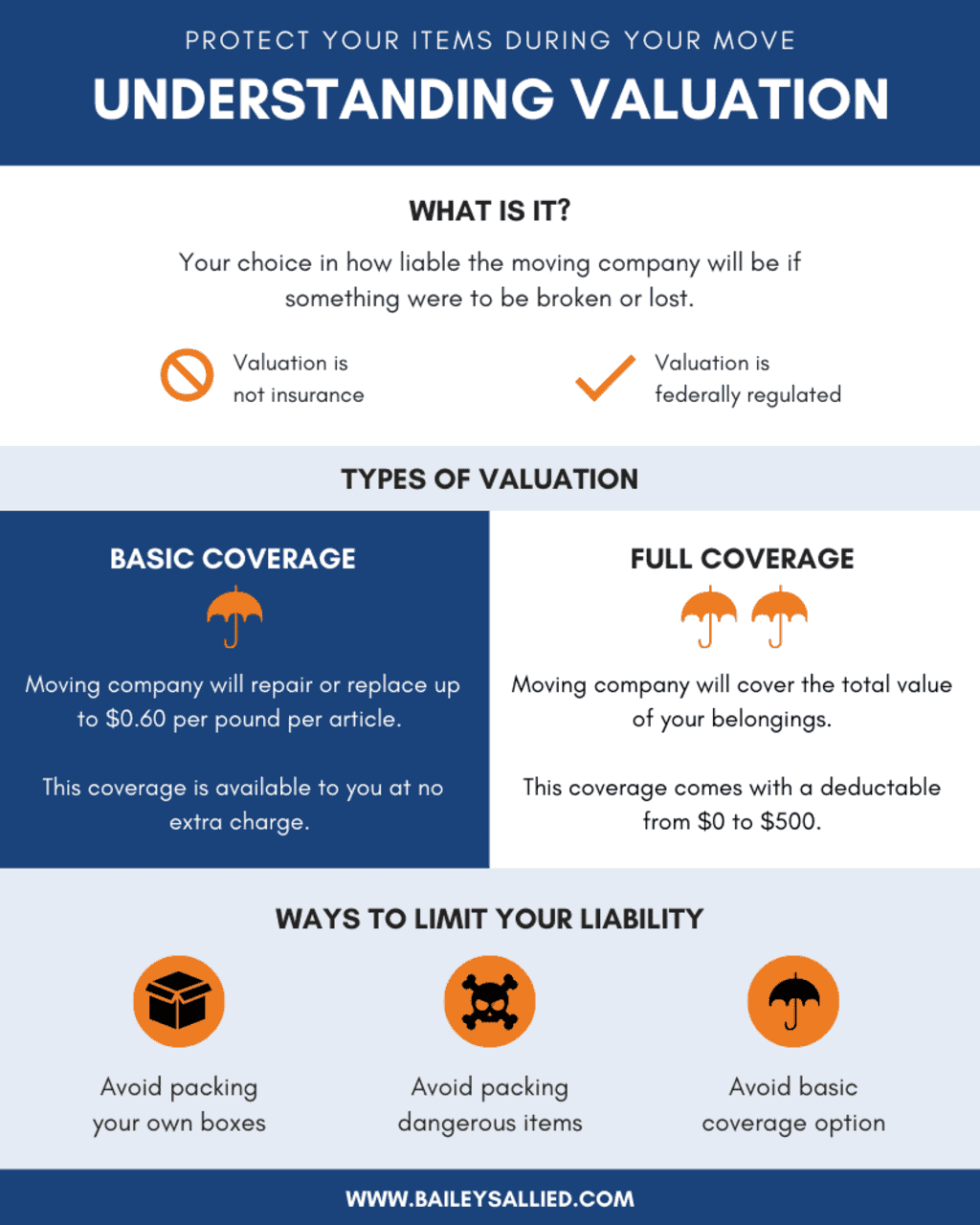So you’re going to move. You’ve likely, by now, read at least a few reviews of various moving companies that seem to have plenty of happy customers, but you see a few that say things like “Worst moving company! They denied my claim even though they shouldn't” or “things broke and then they didn't accept any responsibility”. Why? Why are so may customers happy, when others seem to be so frustrated? 80% of the time, it came down to a customer who didn’t take the time to understand valuation. You can avoid almost all frustration in a move by using a good, reputable moving company and understanding what valuation is (and how to use it).
Move valuation is one of the most important parts of protecting your belongings. But it’s often misunderstood, because it can seem confusing for most people at the start. While moving companies want to make sure they give you a move that fits your budget, move valuation is not the place to skimp – if at all possible. Let’s take a look at why!
Move valuation is your choice in how liable the moving company will be if something were to be broken or lost. It works just the same as when you ship any item with a service like UPS or FedEx. You have to choose how much protection you want for the item, by “declaring” how valuable your shipment is. It works with one item (shipping a package), or a whole house worth of belongings (in the case of a moving company).
Unlike many businesses who determine their own liability, moving company liability is regulated by the Department of Transportation. Just like all shipping and trucking companies. As such, federal law requires us to tell you that valuation is not insurance, but you can think of it like something you pay for protection in case something breaks.
You basically have two options when choosing valuation:
Released Valuation
Basic, or released, valuation is when you aren’t declaring any particular value for your belongings. That doesn’t mean that the moving company isn’t liable though, because it means they’ll value your shipment at an automatic $0.60 per pound of weight. That means that if something breaks, or gets lost, you can get a repair or replacement up to $0.60 per pound that they article weighed.
There is no charge for you if you want this valuation option because it’s very minimal. However, if you want to choose this type of valuation, you’ll have to specifically ask for it – because if you don’t, moving companies are required by law to default you to full coverage and charge for it.
Basic or released valuation may sound enticing because there is no charge, but it’s not right for most people. Consider this scenario: If you have a $1400 TV that weighs 55 pounds, and it breaks during transit – you will only receive $33 if the item can’t be repaired for that amount or less. That’s not a good deal for most people – and it’s one of the most common complaints that customers have about moving companies not being “fair”. That’s why it’s not a good fit for most people. It doesn’t’ leave you much protection – but it is there if you need it.

Full Valuation
In full replacement coverage, you select the value of your shipment and the moving company will cover your belongings for that amount, subject to a deductible. That deductible can be $0, $250 or $500 typically. Which deductible you choose will change the cost of the protection, but each will still give you full coverage of your belongings subject to your deductible.
With full coverage, if something were to break or be lost, one of three things will happen.
- The item will be repaired
- The item will be replaced with a similar item
- A cash settlement for the item will be reached
So let’s go back to the $1400 TV! In this case, the moving company would first look to see if it could be repaired. If not, they will try and replace it with a similarly-valued item or give you a cash settlement for the value of the TV minus your deductible.
If this sounds like a better protection for your goods, it’s because most people want this level of protection. However, that doesn’t’ mean there aren’t limitations. For example, Full Replacement coverage doesn’t cover your High-Value belongings very well without some additional discussion before the move. This is because it’s limited to $100 per pound of weight. Items like valuable artwork or antiques might be worth more than $100 per pound of their weight, so they are considered “high value”. They need to be disclosed separately, in writing, before your move in order to be covered at their full value. A moving company will have a form ready for you if you think you have these types of items. Many customers don’t have any of these items and so if you’re not sure, ask your moving estimator or moving company about anything you think might be high value.
Don’t Limit Your Liability!
Additionally, to help increase your protection, there are a few things you should know about what a moving company will and will not cover in the event of loss or damage. First, moving companies will not cover damage that occurs inside a box you packed, without visible evidence that the box was damaged by them (on the outside). This is because damage to contents inside a box is most common when items aren’t packed properly, or contain hazardous or dangerous contents, no matter how careful the moving company was in moving them. When you pack your own boxes, you’re taking on that responsibility. When the moving company packs it, they take on the responsibility so that means if anything breaks inside a box that was packed by a moving company, they have the responsibility to fix it through the valuation policy you selected.

Remember, this is all outlined as part of Federal Law and when moving its up to you to make use of the law to your best advantage. Choosing which valuation option is best for you is a personal choice, but it can be confusing. If you still have any questions, it’s best to get them answered before you move to avoid any issues during or after the move, when it’s much more difficult to address issues for a moving company.
Moving Soon? Obtain a Free Moving Quote Today!
Are you planning an upcoming move and considering lightening the load using full-service movers? You can obtain a free quote from us today for a better idea on pricing and our upcoming availability. We have offices in Denver, CO; Salt Lake City, UT; Grand Junction, CO; and Colorado Springs, CO and can do moves anywhere from down the road to across the world.


